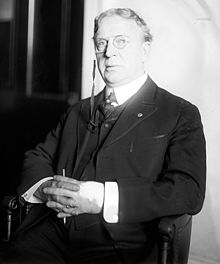Albert Johnson (congressman)
Albert Johnson | |
|---|---|
 | |
| Member of the U.S. House of Representatives from Washington's 3rd district | |
| In office March 4, 1915 – March 3, 1933 | |
| Preceded by | William La Follette |
| Succeeded by | Martin F. Smith |
| Member of the U.S. House of Representatives from Washington's 2nd district | |
| In office March 4, 1913 – March 3, 1915 | |
| Preceded by | Stanton Warburton |
| Succeeded by | Lindley H. Hadley |
| Personal details | |
| Born | March 5, 1869 Springfield, Illinois |
| Died | January 17, 1957 (aged 87) American Lake, Washington |
| Resting place | Hoquiam, Washington |
| Political party | Republican |
Albert Johnson (March 5, 1869 – January 17, 1957) was a U.S. Representative from Washington state.
Born in Springfield, Illinois, Johnson attended the schools at Atchison and Hiawatha, Kansas. He worked as a reporter on the St. Joseph (Missouri) Herald and the St. Louis Globe-Democrat from 1888 to 1891, as managing editor of the New Haven Register in 1896 and 1897, and as news editor of the Washington Post in 1898.
To edit the Tacoma News he moved to Tacoma, Washington in 1898. He became editor and publisher of Grays Harbor Washingtonian (Hoquiam, Washington) in 1907.
Albert Johnson was elected as a Republican to the Sixty-third and to the nine succeeding Congresses (March 4, 1913-March 3, 1933), but was defeated in a bid for reelection in November 1932.
While a Member of Congress, Johnson was commissioned a captain in the Chemical Warfare Service during the First World War, receiving an honorable discharge on November 29, 1918. He served as chairman of the Committee on Immigration and Naturalization (Sixty-sixth through Seventy-first Congresses), where he played an important role in the passage of the anti-immigrant legislation of the 1920s. Johnson was the chief author of the Immigration Act of 1924, which in 1927 he justified as a bulwark against "a stream of alien blood, with all its inherited misconceptions respecting the relationships of the governing power to the governed."[1] Johnson has been described as "an unusually energetic and vehement racist and nativist."[2] He was the head of 'The Eugenics Research Association', a group which opposed interracial marriage and supported forced sterilization of the mentally disabled. In support of his 1919 proposal to suspend immigration he included this quote from a State Department Official referring to Jewish people as "filthy, un-American, and often dangerous in their habits."[3]
Johnson retired from the newspaper business in 1934. He died in a veterans hospital at American Lake, Washington, January 17, 1957. He is buried in Sunset Memorial Park, Hoquiam, Washington.
References
- ^ Roger Daniels, Guarding the Golden Door (NY: Hill and Wang, 2004), p. 55.
- ^ Dennis Wepman, Immigration: From the Founding of Virginia to the Closing of Ellis Island (New York City, Facts on File, 2002), p. 243
- ^ Dennis Wepman, Immigration: From the Founding of Virginia to the Closing of Ellis Island (New York City, Facts on File, 2002), p. 242
Sources
- Daniels, Roger. Guarding the Golden Door: American Immigration Policy and Immigrants since 1882. Boston & New York: Hill and Wang, 2004.
- Goings, Aaron. Johnson, Albert (1869–1957) - HistoryLink.org Essay 8721. [1]
- United States Congress. "Albert Johnson (id: J000114)". Biographical Directory of the United States Congress.
